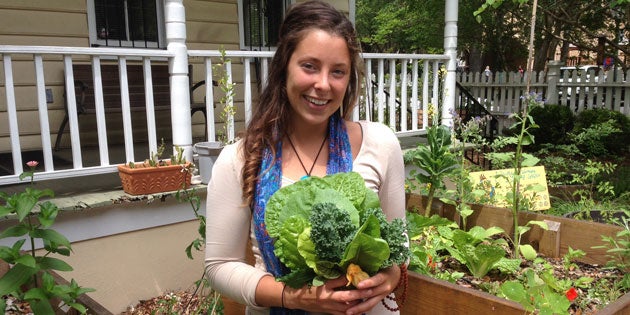Lexa Keane ‘14 is easy to spot. If you notice a brunette bicycling across campus with a cart full of plant matter in tow, you’ve found her.
Since graduating from the College with a political science degree, Keane has remained on campus as a gardener, working for the College’s grounds division. As anyone who’s visited the lush and exquisitely ornamented College of Charleston campus knows, the grounds crew has its work cut out for them, charged with managing a gorgeous and extensive urban arboretum.
Keane, however, is happy to make even more work for herself, finding neglected, out of the way spots across campus for the installation of new flower and vegetable gardens. She doesn’t do it alone; often times student volunteers will take a break from their studies and lend a hand, savoring the chance to get their hands dirty. A number of these students help Keane plant and maintain gardens next to the residence halls in which they live.
In late April 2015, just weeks before graduating, then-senior Katie Erwin ’15 joined Keane to help maintain a garden plot tucked away beside the Women’s and Gender Studies office at 7 College Way. The two women discussed the concept of companion planting, and how certain plants benefit each other when planted together, even if it’s not obvious to onlookers.
“It’s not a cutesy thing,” Keane says of her gardens. “Yeah, it’s beautiful, but there’s so much thought and intention behind it.”
A radish, for example, helps aerate the garden soil and, when planted beside squash, is a deterrent for a destructive pest, the squash vine borer. Keane makes it a point to share such information with her garden protégés.
“There’s something really special about passing down knowledge,” says Keane, a former intern in the College’s Office of Sustainability. “That’s what we do.”
Gardening also fosters friendship between the women, as well as a sense of serenity.
“I don’t think about anything else while I’m doing this because it demands presence,” says Erwin, an international studies major from North Carolina.
Having a physical connection with the Earth tends to promote deep discussions between the women. It wouldn’t be unusual for them to, say, consider the effects of racism in society while planting carrots. The promise of a young garden seems to inspire the women to fashion a better world.
As Erwin says, when planting an organic and sustainable garden, she and her friends are “mending past wrongs and creating something new and alive together.”
Gardening can also inspire confidence.
“Wow! We did this,” says Erwin, surveying the bountiful results of her hard work. “This garden looks amazing and we can feed people.”

One of three raised beds Keane and student volunteers have installed and planted off Coming Street, near offices for the Department of Political Science.
Raising healthy plants is only half the equation, however. Keane makes sure that gardens break down just as beautifully as they grow up. That’s why she leads the College’s compost program, collecting food and plant waste from campus as well as from downtown businesses. She then places all this organic material in compost bins off Coming Street that she regularly turns over and aerates, hastening the material’s decomposition.
Lending Keane a hand one afternoon in late April was then-senior Ava Gettinger ’15, who donned rubber boots before stepping into the compost pit and dumping out lots of soft and squishy leftover food. Then Gettinger, a self-described food and nutrition fanatic as well as a psychology major, helped Keane stack pieces of torn cardboard on top of the plant waste.
Gettinger’s efforts are well appreciated by Keane, and not just because the shredded cardboard helps make better compost. The time and labor donated by Gettinger, Erwin and others, she says, helps form a sense of community among the gardeners.
“It’s just so much better when you have an amazing group of women to work with,” Keane says.
Solidarity is especially important when walking across campus in soiled clothes carrying shovels and wheelbarrows. There’s nothing glamorous, the women insist, about getting knee-deep in compost, spraying fish emulsion and kelp fertilizers, or showing up to class smelling less than fresh. But if they’re dirty, at least they’re dirty together.
“It created this really amazing blend of perspectives,” Keane says of the gardening teamwork. “We’re all co-dreaming this narrative. It’s so much fun.”








